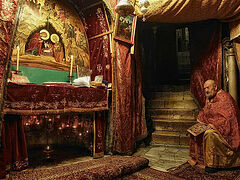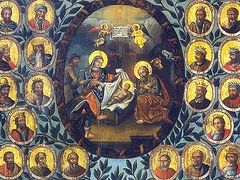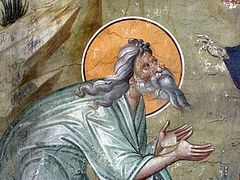In the name of the Father and the Son and the Holy Spirit!
Celebrating the forefeast of the Nativity of Christ today, the holy Church gives us images of righteous men of the Old Testament who awaited Christ the Savior all their lives and bequeathed this expectation to their children and grandchildren, who maintained their faith and hope to the end. It compels us to join them so we might be able to greet with awe the coming great feast, which is given to us not as a memory, but as a co-presence and experience—entering the cave and worshiping with the shepherds and magi. And today, we must not only recall the Old Testament Fathers, but also take from them what is most appropriate for our times.
We have sung today: “Great are the achievements of faith, for the Three Holy Youths rejoiced in the fountain of flame, as if by restful waters, and the Prophet Daniel appeared as a shepherd of lions as of sheep. By their prayers, O Christ God, save our souls” (Troparion of the Holy Fathers). The holy Church remembers them now because they’re closer in time to the coming of Christ the Savior than those Forefathers whom we glorified a week ago, and also because they show us a vivid prefiguration of the coming of Christ the Savior. But not only them, but all of Old Testament mankind had great righteous men among them, although they were in darkness.
We no longer see through a glass darkly, but He Who was to come and suffer for the deliverance of many has already appeared—our faith is completely different. If we’re told now that we must be long-suffering, then our main example is the Lord. Thus the Apostle, calling the faithful to patience, points them to the Author and Finisher of our faith; Who for the joy that was set before Him endured the Cross, despising the shame, and is set down at the right hand of the throne of God. For consider Him that endured such contradiction of sinners against Himself, lest ye be wearied and faint in your minds (Heb. 12:2–3). He left us an example, but the Old Testament man had but one word, one promise: “The Seed of the woman shall crush the head of the serpent” (cf. Gen. 3:15).
Old Testament man was resettled from Paradise to earth, to be “raised up honorably” here and ascend again to the world above.
Adam waited 900 years. He named his first son, “Acquired.”1 He not only had this faith and long-suffering, but also bequeathed it to everyone around him when he was dying. We know how Noah, with great patience, fulfilled the Lord’s commandment, to general ridicule. We know that Eber also endured ridicule, as the only one who didn’t go to build the Tower of Babel, trying to stop those who wanted to commit this lawlessness. We also know of Job’s patience.
Why should we be patient? According to the Apostle Paul, we need patience in order to gain experience. We know this well from our regular work. If we learn something with patience, then we’ll do good work, whereas the work of an impatient man is fruitless. Patience breeds experience, and that is why the Church, on behalf of all these great righteous men, commands us to patiently preserve our hope.
If patience is of such great importance, then what is it? How can we acquire it?
“Patience,” says St. John Climacus, “is submitting oneself to the expectation of daily sorrow” (Ladder of Divine Ascent 27:70).
This is exactly how it was for Old Testament mankind. The Lord told them that they would earn their bread by the sweat of their brow. But wasn’t it also said to us: In the world ye shall have tribulation (Jn. 16:33)?
In our time, when we, the faithful, are despised, insulted, and humiliated, awaiting the Nativity of Christ and standing now before the great Fathers of the Old Testament, we must understand that it cannot be otherwise, that we must accustom ourselves to patience and await these sorrows.
Who among us can be called patient?
“It is not when we courageously endure the derision of our father that we are judged patient, but when we endure it from all manner of men” (Ladder of Divine Ascent 4:84).
And so it was for all of them. Moses showed such patience when those whom he delivered from Egyptian slavery by the will of God rebuked him: “Why did you lead us out of Egypt?” Such patience was also shown by David, who not only didn’t become angry at Shimei, but even forbade those who wanted to take vengeance on the offender, saying: What have I to do with you, ye sons of Zeruiah? so let him curse, because the LORD hath said unto him, Curse David. Who shall then say, Wherefore hast thou done so? (2 Kg./Sam. 16:10). It’s a great thing to be patient in the face of abuse.
“I once saw three monks,” says St. John Climacus, “receive the same injury at the same time. One felt the sting of this and was troubled, but kept silent; the second rejoiced at his injury for the reward it would bring him, but was sorry for the wrongdoer; and the third, thinking of the harm his erring neighbour was suffering, wept fervently” (Ladder of Divine Ascent 8:27).
We, who have yet to reach the state of this first brother who was offended and kept silent, can’t even imagine the work of the second and the third. But we have to do at least the first work, because when we’re silent, we’ve already done half the work, thereby expressing humility. The second brother who rejoiced for himself and grieved for the one who rebuked him couldn’t yet pray for his enemy, but the third was like the Lord Himself, Who forgave His tormentors from the Cross and prayed for them: Father, forgive them; for they know not what they do (Lk. 23:34).
In our time, when true teaching is spat upon, when it’s considered practically an obligation to offend and humiliate the servants of Christ, when every one of us believers is considered to be “darkening the national consciousness and believing in nonsense,” and when we now stand on the threshold of this greatest feast, we must greet Christ the Savior with patience, as the Church commands. Today we have before us these images of the righteous of the Old Testament, who had only one testimony, and that received not by themselves, but by the first man. After Christ, the Author and Finisher of our faith, came to earth and suffered reproach for us, are we not in need of the same labor of patience as our fathers were? They, like our ancestors, are responsible for us; they give us examples of faith and patience, and we must follow them.
And we needn’t weep about being offended this way. After all, they offended Christ the Savior Himself. We should feel sorry that there are people who could be members of the holy Church but who are in darkness; we have to pray for them and shed fervent tears. It’s much easier for us to have patience than in the Old Testament, only we don’t go that way. We have faith and even the desire to confess it, but not patience. But the Old Testament righteous give us an image of patience. If the coming feast is a joy for many of us, then remember the Old Testament Fathers, who walked the path of patience and acquired faith and spiritual experience along the way.
Awaiting the birth of the Lord, we should rejoice even when He sends us great trials. And today when we glorify the Old Testament righteous, we have to remember that our Redeemer is being born and that He will open the doors of Paradise to us.
Amen.





